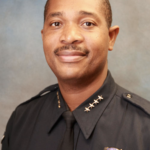D.O.P.E. Spotlight Interview – Chief Joseph G. Paulino
Spotlight on Chief Joseph Paulino
 Chief Joseph Paulino says the first interaction a child has with a police officer can frame their impression of law enforcement for a lifetime. “In the fifth grade, I was part of what they call the Deputy Auxiliary Police program which is facilitated through LAPD,” he says, “and I had a great experience, and it was those first encounters that brought me into this career field.”
Chief Joseph Paulino says the first interaction a child has with a police officer can frame their impression of law enforcement for a lifetime. “In the fifth grade, I was part of what they call the Deputy Auxiliary Police program which is facilitated through LAPD,” he says, “and I had a great experience, and it was those first encounters that brought me into this career field.”
The “career field” he speaks of is, of course, law enforcement. After his experience with the Deputy Auxiliary Police program, he joined the Explorers where he learned CPR, had a chance to travel, meeting law enforcement officers from all walks of life. After serving in the military, he returned to his home community, and now Chief Paulino leads the t. “We do active patrol across 109 square miles, and we support over 73 sites,” Chief Paulino says. The department’s officers encounter adults and school children of all ages, and Chief Paulino knows how important it is for those encounters to be positive experiences. “We have over 50,000 students in our district every day, so we have 50,000 opportunities to get that right or wrong.”
Chief Paulino believes that children should be taught in school how to interact with law enforcement officers. “If you arrive at the third grade without the ability to read,” Chief Paulino says, “it creates a problem for your future. I think it’s the same in terms of law enforcement and understanding the laws in our community, and I think younger generations should get a head start. We can’t wait until they’re 17 or 18 years old.” With Respect to Officer Patrol Encounters, one of the things Chief Paulino thinks children should understand is that both parties in a patrol encounter are under stress. “Most people don’t have law enforcement experience,” he says. “They know that it’s very stressful and nerve-wracking when they have an encounter with a law enforcement officer, but I think a lot of people are surprised to find out that it’s a stressful encounter for the law enforcement officer as well.”
Chief Paulino says the key to having a positive interaction with law enforcement is to demonstrate respect for the officer and to consider the officer’s safety. “Always lean on making sure you’re respectful to the officer, regardless of the language being utilized,” Chief Paulino says. Having spent 15 years training cadets at the police academy, Chief Paulino acknowledges that the officer has the first responsibility to bring a sense of dignity to an encounter, but when an officer fails in that regard, the citizen has an opportunity to change the tone. He cites the work of the late Dr. George Thompson, a language scholar and veteran of law enforcement who founded the Verbal Judo Institute which teaches people how to de-escalate tense encounters using rhetorical techniques. Thompson’s work has been used by more than 1,000 law enforcement agencies, and Chief Paulino feels that citizens could benefit from his de-escalation techniques as well.
In regards to considering an officer’s safety, Chief Paulino says it’s all about your hands. “Safety 101 for police officers in any academy is that if anything is going to cause you harm, it’s going to come at the hands of someone else.” He tells people to make sure their hands are visible at all times during an officer patrol encounter. Chief Paulino also cautions citizens from making abrupt movements. He says, “If you need to move, just ask the officer for permission. If they request an item, explain to them where that item is and request their permission to retrieve it.”
Joining D.O.P.E. the Movement One evening, Chief Paulino was watching the news, and he encountered a story featuring Stan Campbell, founder of D.O.P.E. the Movement. The segment focused on a program Stan founded that simulates patrol encounters between law enforcement officers and autistic teens — an interaction that can go badly if the officers don’t recognize and understand the behaviors associated with autism. Both parties in the interaction learned valuable lessons. “It was a powerful segment,” Chief Paulino says, “I told my team: ‘We’ve got to get in touch with that guy.”
That is how Chief Paulino started his involvement with D.O.P.E. the Movement, an organization dedicated to De-escalating Officer Patrol Encounters. He was drawn to the program because he saw there was an opportunity to educate people on both sides of a patrol encounter — the citizen and the officer. Chief Paulino tells law enforcement officers that “we have more responsibility and accountability. Make sure that, regardless of what happens, you are professional in delivering the needed service to our community and that you do it with the right passion and within the parameters of trust.” He reminds officers that they should always guard the dignity of others. “We should not have people fight us for their dignity,” he says. Nonetheless, Chief Paulino acknowledges that law enforcement officers don’t always live up to that charge, and when citizens become confrontational with patrol officers, it’s often because they feel they are not being treated with dignity. For citizens who feel a law enforcement officer is violating their rights, Chief Paulino offers the following advice: “Control your emotions and follow directions. After the incident, there’s a process for filing a grievance if you feel you’ve been wronged. Don’t try to resolve the grievance in the field with the very people that have created the grievance.”
The D.O.P.E. mobile app has tools to help users document and report negative interactions with patrol officers. Advanced users can take record videos with the app, which is automatically saved to D.O.P.E.’s private servers and texted to three individuals the user has designated as emergency contacts. It also contains information on how to properly file a grievance against an abusive officer.
“We’re all painted with one brush,” Paulino says of law enforcement officers. Because one bad encounter can tarnish a citizen’s impression of all officers for life, it’s important to hold bad actors accountable.
 SHAWN VINCENT – LITIGATION CONSULTANT
SHAWN VINCENT – LITIGATION CONSULTANT
Shawn Vincent is a litigation consultant who helps select
juries in self-defense cases, and he manages public interest
of high-profile legal matters. If you have any questions for
Shawn, or would like topic specific articles, please send your
request to dopethemovementinfo@gmail.com attention Shawn Vincent Articles
Leave a Comment
You must be logged in to post a comment.


